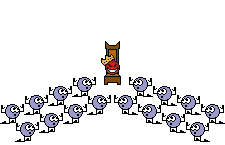The question box at the end of the article contains the question "What is an evidence of independent thinking, and what can help us to avoid it? "
The clear answers from the paragraphs are that noting that "Gods organization has made adjustments in the past, to point out their fallability is the result of "Pride" and independent thinking can be avoided by remembering where you learned Bible truths in the first place. "
Yes, especially when you consider what the WTS has on it's own website:
Do Not Be a Victim of Propaganda!
THERE is a difference—a big difference—between education and propaganda. Education shows you how to think. Propaganda tells you what to think. Good educators present all sides of an issue and encourage discussion. Propagandists relentlessly force you to hear their view and discourage discussion. Often their real motives are not apparent. They sift the facts, exploiting the useful ones and concealing the others. They also distort and twist facts, specializing in lies and half-truths. Your emotions, not your logical thinking abilities, are their target. The propagandist makes sure that his message appears to be the right and moral one and that it gives you a sense of importance and belonging if you follow it.You are one of the smart ones, you are not alone, you are comfortable and secure—so they say. How can you protect yourself from the types of people that the Bible calls "profitless talkers" and "deceivers of the mind"? ( Titus 1:10 ) Once you are familiar with some of their tricks, you are in a better position to evaluate any message or information that comes your way. Here are some ways to do this. Be selective: A completely open mind could be likened to a pipe that lets just anything flow through it—even sewage. No one wants a mind contaminated with poison. Solomon, a king and educator in ancient times, warned: "Anyone inexperienced puts faith in every word, but the shrewd one considers his steps." ( Proverbs 14:15 ) So we need to be selective. We need to scrutinize whatever is presented to us, deciding what to accept and what to reject. However, we do not want to be so narrow that we refuse to consider facts that can improve our thinking. How can we find the right balance? By adopting a standard with which to measure new information. Here a Christian has a source of great wisdom. He has the Bible as a sure guide for his thinking. On the one hand, his mind is open, that is, receptive to new information. He properly weighs such new information against the Bible standard and fits what is true into his pattern of thinking. On the other hand, his mind sees the danger of information that is entirely inconsistent with his Bible-based values. | |||
| Use discernment: Discernment is "acuteness of judgment." It is "the power or faculty of the mind by which it distinguishes one thing from another." A person with discernment perceives subtleties of ideas or things and has good judgment. Using discernment, we will be able to recognize those who are merely using "smooth talk and complimentary speech" in order to "seduce the hearts of guileless ones." ( Romans 16:18 ) Discernment enables you to discard irrelevant information or misleading facts and distinguish the substance of a matter. But how can you discern when something is misleading? Put information to the test: "Beloved ones," said John, a first-century Christian teacher, "do not believe every inspired expression, but test the inspired expressions." ( 1 John 4:1 ) Some people today are like sponges; they soak up whatever they come across. It is all too easy to absorb whatever is around us. |
 ...........................
........................... ...OUTLAW
...OUTLAW